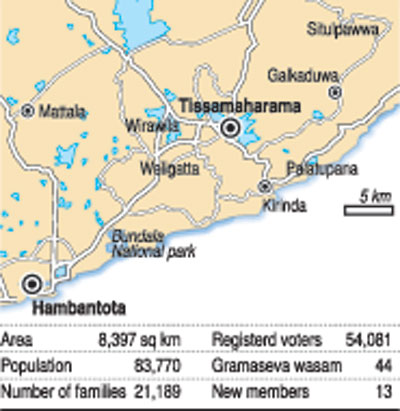News
In the South, big guns battle out big issues
The sights and sounds of the deep South are still alluring though the transformation from a rural setting to concrete jungle is clearly evident.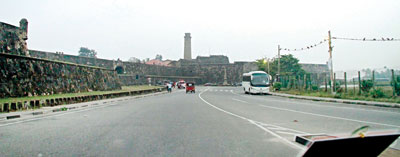
The lush green paddy with the harvest due in weeks sways as the gentle wind blows. Vast stretches of banana plantations seem unending. Harvest of the seasoned fruits are underway. Some are being loaded on to lorries with the banana leaves serving as packaging material.
Pumpkin, ash pumpkin and a variety of vegetables are stacked high at makeshift outlets – all signs of the rural prosperity as we drive past Embilipitiya, Thanamalvila towards Tissamaharama.
The enchanting sounds of a variety of birds is harmonious. Species which had flown from the foothills of the Himalayas to escape the biting cold are gathered around water pools. Buffaloes roam freely in herds. Shepherding them is an old man on a motor cycle, a change from one in amudey (loin cloth) with a stick in hand.
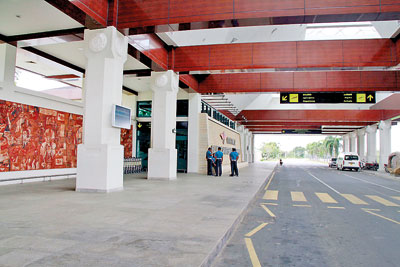
Mattala Airport: Where plane engines rarely roar
The Mahinda Rajapaksa International Airport, touted as the only airport in the world where the fewest number of planes land, is growing to become an ugly sight.
The once well manicured bougainvillea plants of various hues that divide the four lane highway are dying. In some areas weeds have taken over. As night falls, herds of elephants roam. They outnumber the passengers meant to use the airport.
A well paved highway from Mattala to Hambantota is almost deserted barring sporadic traffic. Sign boards warn of elephant crossings. A journey to Hambantota along the route tells the same story.
A Port has replaced the paddy fields and other farming areas. The locals including the villagers are not fortunate enough to see what is going on inside except to be told there is development activity. They require permission from bigwig bureaucrats in Colombo. Armed Navy personnel and private security groups guard the area much the same way they would protect a nuclear reactor in a foreign land.
Rajapaksa International Convention Centre stands divided by a jungle patch from the port. It is protected by a concrete frame wall with steel mesh. Even if there are no international conferences, visitors are entertained to a new feat. Herds of elephants crash the wall from different places to parade on the road. When one side is broken and repaired, the other side is breached. The game continues.
In just five days from now, voters in these areas will have to decide whether they would opt for more change or remain faithful to the old system. The polls will be held on February 10, and the main contenders are making their pitch at meetings.
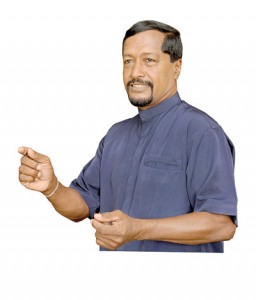
UPFA candidate for Habaraduwa PS:A.W.Susil Kumara
In the Southern Province on the whole, party leaders were crisscrossing towns addressing meetings while senior politicians from other districts were being invited to speak at pocket meetings of candidates.
Although the interest and enthusiasm among voters were picking up slowly, party leaders and senior members were not taking things lightly with President Maithripala Sirisena, Prime Minister Ranil Wickremesinghe, former President Mahinda Rajapaksa and JVP leader Anura Kumara Dissanayake addressing several meetings and some of them even billed to return to the province to address meetings within the next three days.
“This may be a local election where voters are more interested in issues concerning the village, but political parties are taking it seriously and it’s like a national election,” Sachindra Weragala, a young voter from Galle said.
A visit by a team from the Sunday Times revealed that in contrast to other districts, national issues such as the impact of the proposed constitution, the Treasury Bond issue, the Hambantota Port deal, failure to take action against those involved in corruption were topics that came up during campaign meetings.
In the Hambantota district, elections are being held for one Municipal Council (Hambantota), one Urban Council (Tangalle) and 10 Pradesiya Sabhas; with a total of 479,498 voters.
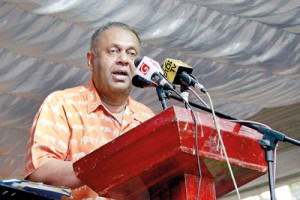
Mangala Samaraweera in Matara: Our candidates are clean
The district has seen some of the largest projects including Mattala airport, Sooriyawewa international cricket stadium and the Port development, but employment generation has been minimal.
Though in most areas Election Commission officers have been tough in implementing election laws, the JVP member here claims that cabinet ministers in the district were misusing state property including the services of public sector employees and state vehicles.
“There are instances where chits are being issued for people to buy liquor from the bar or to obtain 10 cement bags. These are sometimes difficult to prove and no action has been taken,” Sarath Chandrasekara Yapa, a JVP a candidate for the Lunugamvehera Pradeshiya Sabha said.
“Application forms for the recruitment of persons to the Housing Department are being distributed. I have complained to the Elections Department and I hope action will be taken. UNP candidates are offering housing loans on the basis that they will get the second instalment only if they come for canvassing,” he said.
In a humorous twist, one of the residents in the district had turned up at a UNP campaign meeting and received 10 bags of cement, but the following day he joined a Sri Lanka Podujana Peramuna (SLPP). Following this a UNP candidate had taken away his bags of cement.
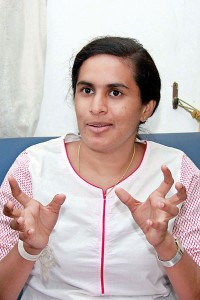
Thilini Medagoda, contesting for the Bentota PS from the UNP
In Hambantota where elections are being held for the Municipal Council for which 21 members will be elected, a former Mayor, Eraj Fernando who figured in a 2015 incident where UNP members were attacked, is re-contesting for the post under the UPFA ticket, and is facing competition from the SLPP and UNP candidates.
In the Matara district, elections are being held for the Matara Municipal Council where 28 members will be returned, and for two Urban Councils-Ambalangoda and Hikkaduwa. In addition, polls are being conducted for 15 Pradeshiya Sabhas. Some 644,800 voters are registered to vote.
The lack of development, new projects and delays in compensating flood-affected people, in addition to internal squabbles among leaders of the main parties are impacting the voting patterns.
The UNP and the SLFP have an advantage for the Weligama Urban Council after the SLFP nominations were rejected and both main parties canvassing for the SLPP votes.
“We expect that some of them will vote with us as they do not like the SLFP members, but we are not dependent on those votes and are confident of winning the council,” UNP candidate Janaka Wimalasena said.
The campaign in the Matara district was reaching its peak by Wednesday, with as many as 25 meetings being held on that day alone and Foreign Minister Mangala Samaraweera addressing most of them.
“The former Minister Mahinda Yapa Abeywardena has said that people should not look at who the candidate is, but to vote for the ‘Flower bud’ (SLPP), but we say that our candidates are clean and that you can see who the candidates and vote for them, whereas only rougues are contesting for them,” Mr Samaraweera told a campaign rally.
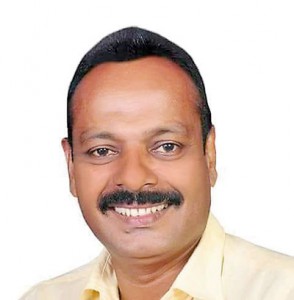
SLPP candidate for Habaraduwa PS: Bandupala Abeykoon
In the Galle district, 848,877 voters are registered to elect members to one Municipal Council (Galle) where 35 members will be elected; and two Urban Councils (Ambalangoda and Hikkaduwa). Elections will be held for 16 of the 17 Pradeshiya Sabhas as polls for the Elpitiya PS has been delayed on a court order.
One of the main promises made by the UNP in the campaign has been the Deduwa tourist development project that would cover the Bentota area. A video presentation of the project was displayed on election stages.
The main thrust of the SLPP campaign has been on the grounds that the vote should be cast to show gratitude to former President Mahinda Rajapaksa for defeating the LTTE and for his campaign against the sale of state ventures.
UPFA candidate for the same Pradeshiya Sabha, A.W.Susil Kumara said the campaign is being carried out on the grounds that the Government has already helped to develop the area and further development could be obtained by voting for them.
“We will win this council as the area has already seen several development projects such as the renovation of the Habaraduwa railway station, new shopping complex in Ahanggama and a vocational training center among others,” he said.
Women candidates contesting the elections too have generated interest as some of them have experience serving in various societies and voluntary organisations in the area.
Thilini Medagoda, contesting for the Bentota Pradeshiya Shabha from the UNP was the Deputy Speaker in the Youth Parliament and she says her experience as a social worker and coming from a background of family members who were involved in politics will help her serve the people.
“I have plans to train youth for jobs which will come up in the tourist sector through the Deduwa project in Bentota. I will also resolve the lack of potable water,” Ms Medagoda said.
Additional reporting: Sumathipala Diayagahage (Galle), Krishan Jeewaka Jayaruk (Matara) and Rahul Samantha Hettiarachchi (Hambantota)
| Kataragama: Pall of gloom after shooting | |
| The Kataragama town bordering the Hambantota district which usually draws large crowds during Poya days was under a pall of gloom, last Wednesday, following an incident 10 days before, where a motorcyclist was killed in a shooting by the police.Twenty-five-year-old Pathiranage Roshan and his friend Nuwan Buddhika were returning after a party on January 21, when a policeman tried to stop them and fired at the bike killing Mr Pathiranage and injuring the other.The shooting incident sparked protests by the villagers and mob attacks on police posts around the sacred area prompting the police to arrest at least 58 persons. They were given surety bail of Rs 200,000 each.The villagers accused the police for opening fire deliberately at the motor cycle rider without making an attempt to stop the motorcycle. Politicians including candidates from the UPFA and the UNP blamed the police for the action prompting the Inspector General of police Pujith Jayasundara to visit the area and initiate action against the policeman involved. The Officer in charge of the Katargama police station, IP S.K. Upali had been transferred to the area after the previous incident in Rathupaswala, Weliveriya where protesters demanding clean water were fired upon. |
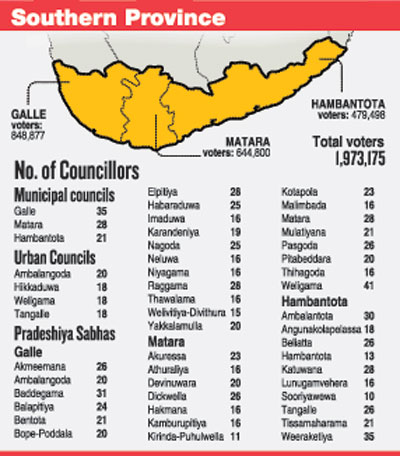
| Tissamaharamaya PS: The people will once again vote for our programmes, JVP | |
The JVP, which returned victorious at the Tissamaharamaya Pradeshiya Shabaha elections for two consecutive terms from 2002, that was picked as the best council for three consecutive terms, hopes that voters will elect them again at this election. 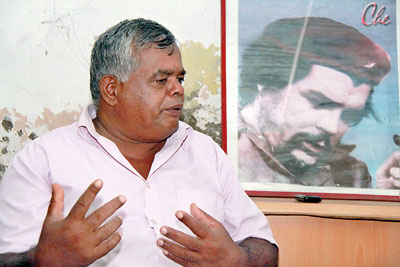 H.L. Jayasiri: Confident of winning The JVP that is spearheading its campaign under the theme ‘Newatha Dinana – Tissa Ape Sabhawa’ (Re-winning –Tissa our Council) has promised to re-implement its programmes during their administration –if they are elected. The JVP in its island-wide election campaign have widely spoken about the approach they used to administer this council and have declared that similar programmes could be used if they were elected in other councils too. H.L. Jayasiri has served as the first Chairman of the Tissamaharamaya PS in 2002 and re-elected to the post at the 2006 election is leading the JVP team. “The people in this area voted us for our programmes and not the party. They enjoyed the benefits for about eight years, but unfortunately after the last local election the public lost those benefits due to the change of power,” Mr Jayasiri said. He said they drew up a plan for almost every sector such as health, education, development, road construction, vocational training, the environment and implemented it accordingly. Mr. Jayasiri, explaining the model used to develop the council, said, in the 44 Grama Sevaka divisions they organised a group of volunteers to have regular Shramadana campaigns under a programme known as ‘Purawara Pubuduwa’(Awakening the region). He said people joined these programmes irrespective of their party affiliations. “For instance under the ‘Suwapelahera’ programme they got the help of doctors from various parts of the country to hold medical clinics on a voluntary basis. They brought medicines required, shared accommodation in houses and conducted the clinics on a regular basis,” he said. He said under a programme to protect the environment, the river beds were protected while an organic waste project was implemented successfully and organic fertilizer was sold in packets. “We had a programme to collect garbage twice a day throughout the week. One team was deployed to sweep the area throughout the day and another team to collect garbage twice a day. The people were aware that keeping the area clean would help to bring more tourists and it would eventually help to raise their income,” he said. Mr Jayasiri said, due to the popularity of the council, during the latter stages the former government brought the council under the administration of the Commissioner on the grounds of ‘inefficiency’ and eventually used political pressure to see that the JVP did not win the council. “However, this year we are determined to regain the council again as we believe that the people understand how efficient the programme was,” he said. The Tissa PS area has a population of 83,770 and of them 54,081 are voters. Twenty one members will be elected to the council. |


